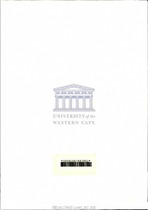The body in hospitalization. a study of doctors, nurses and patients in a Cape Town teaching hospital
Abstract
South Africa's health transformation blueprint is designed to replace apartheid's inequities and instill instead a new utilitarian approach by the health care sector. This study gives attention to the medical gaze and the body in hospitalisation. At macropolitical level the study focuses on the ways in which the new health policy impacted on power relations and multi-levelled subject positions of medical and nursing staff, as well as on patients in a hierarchy of spaces such as in the wards, in the institution and at a national level, in terms of policy implementation and the reconstruction of the health care services. It shows that policy and institutional discourses and arrangements were
embedded in a regime of visuality which discursively homogenised people from different cultural realities. Yet, at the same time biases related to constructions of bodies in relation to class, age, gender and 'value' continued to exist. At the level of hospital protocols and structure the thesis examines the social, political and conceptual frameworks that conveyed, allowed or disallowed particular meaning to the institution. It describes the formal, dominant discourses and processes in the wards and show how these impacted on everyday interaction and relations of power, autonomy, authority, conflict and resistance. The study shows that for patients there often was a disjuncture
between policy and practice, as biomedical practitioners and policy makers struggled to define the scope and implementation of health care services in response to pressures for change and concomitant fluctuation. By problematising the notion of the medical gaze and by giving attention to discourses and practices, which were not legitimated by it, the study draws attention to realities that were deemed largely irrelevant by western medical epistemology, such as subjective experiences and knowledge, which, though lacking the same legitimation as the gaze, did not disappear but only become less visible. In this way the study widens the social context in which medical practice can be
perceived and understood within a transforming South African health care system.

